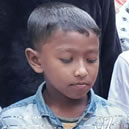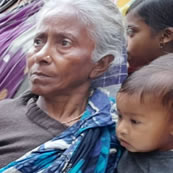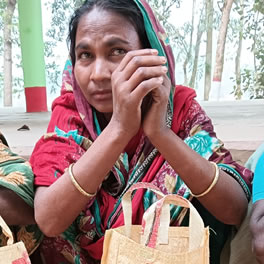Lotus Ministry Trust Role in Rural Food Security & Impact Analysis
- David Burgess
- Apr 28, 2025
- 7 min read
Updated: May 9, 2025
Key Takeaways
Lotus Ministry Trust focuses on providing nutritious vegetarian meals to impoverished communities in Northern Bangladesh.
The trust's programs aim to not only alleviate hunger but also promote overall health through balanced diets.
Community involvement is crucial, with local volunteers participating in food distribution and educational outreach.
Lotus Ministry Trust has successfully improved the nutritional status of over 100,000 individuals with its food relief initiatives.
Future plans include expanding to more rural areas and forming strategic partnerships for wider impact.
Lotus Ministry Trust's Initiatives for Enhancing Food Security
Your Donation Helps These Volunteers Feed Neglected Citizens Of Bangladesh
Food security is a critical issue, especially in rural areas where access to nutritious meals can be limited. Lotus Ministry Trust has made significant strides in this field, focusing its efforts on improving food security in Northern Bangladesh. Through a combination of strategic planning, community engagement, and sustainable practices, the trust aims to ensure that everyone has access to the nourishment they need.
Foundation and Mission of Lotus Ministry Trust
Established in 2021, Lotus Ministry Trust operates with a clear mission: to deliver nutritious vegetarian meals and educational support to underserved communities. The trust's founders recognized the pressing need for food security in rural Bangladesh, where many families struggle to access basic necessities. By prioritizing health and sustainability, the trust has developed programs that not only feed the hungry but also empower communities through education.
Main Programs and Strategies for Food Security
Lotus Ministry Trust employs a multi-faceted approach to enhance food security. One of its primary programs involves distributing culturally appropriate, nutritionally balanced food. These meals typically include local staples such as rice, lentils, and vegetables, ensuring that recipients receive a well-rounded diet.
Besides that, Lotus Ministry Trust has implemented a home delivery system for individuals who cannot reach distribution centers. This initiative specifically targets children, the elderly, and the disabled, ensuring that even the most vulnerable members of the community receive the support they need.
Role of Community Involvement
Community involvement is at the heart of Lotus Ministry Trust's success. Local volunteers play a vital role in the trust's operations, from distributing food packages to organizing educational events. This grassroots approach not only strengthens community bonds but also fosters a sense of ownership and responsibility among participants.
By engaging local communities, the trust can tailor its programs to meet specific needs, ensuring that its efforts are both effective and sustainable. This collaboration has been instrumental in building trust and promoting long-term change.
Impact of Food Security Programs on Rural Communities
The impact of Lotus Ministry Trust's food security programs on rural communities has been profound. By providing consistent access to nutritious meals, the trust has significantly improved the health and well-being of countless individuals.
Improvement in Nutrition and Health
Access to nutritious food is essential for maintaining good health, especially in rural areas where malnutrition can be prevalent. Lotus Ministry Trust's initiatives have led to noticeable improvements in the nutritional status of many families. By providing meals rich in essential vitamins and minerals, the trust has helped combat malnutrition and related health issues.
One of the most significant outcomes has been the improvement in children's health. With access to balanced meals, children in these communities are experiencing better growth and development, which lays a strong foundation for their future well-being.
Economic Benefits and Opportunities Created
Beyond improving health, the trust's programs have also generated economic benefits for rural communities. By sourcing food locally, Lotus Ministry Trust supports local farmers and stimulates the local economy. This approach not only provides farmers with a stable income
but also encourages sustainable agricultural practices.
By addressing both immediate needs and long-term goals, Lotus Ministry Trust has created a comprehensive model for enhancing food security and fostering sustainable development in rural communities.
Community Volunteers Help With Food Aid Distribution
Case Studies of Successful Community Transformation
One of the most compelling examples of Lotus Ministry Trust's impact can be seen in the village of Charghat. Before the trust's intervention, the community faced severe food shortages and malnutrition was rampant among children. Lotus Ministry Trust initiated a comprehensive food relief program, distributing nutritious meals and offering educational workshops on sustainable agriculture.
As a result, the community experienced a remarkable transformation. Within a year, the rates of malnutrition significantly decreased, and local farmers reported increased crop yields due to the adoption of new farming techniques taught by the trust. The village became a model of resilience and self-sufficiency, showcasing the power of targeted food security initiatives.
Another success story is from the village of Natore, where Lotus Ministry Trust focused on empowering women through nutrition education and skill-building workshops. Women in the community learned how to grow kitchen gardens, providing their families with fresh produce and reducing their reliance on external food aid. This initiative not only improved food security but also elevated the social and economic status of women in the village.
Charghat: Significant reduction in malnutrition and improved crop yields.
Natore: Empowerment of women through kitchen gardens and nutrition education.
Rangpur: Community-led initiatives resulting in sustainable food practices.
Challenges Encountered and Lessons Learned
While Lotus Ministry Trust has achieved considerable success, it has also faced numerous challenges in its journey to enhance food security. Understanding these obstacles and learning from them is crucial for refining future strategies and ensuring sustainable outcomes.
One of the main challenges has been the logistical complexity of reaching remote communities. Transporting food and resources to isolated areas requires careful planning and coordination, often involving collaboration with local organizations and authorities.
Issues in Resource Allocation and Distribution
Resource allocation is a critical aspect of any food security initiative. Lotus Ministry Trust has had to navigate the complexities of ensuring that resources are distributed equitably among communities. This involves assessing the specific needs of each area and prioritizing resources accordingly.
In some cases, the trust encountered difficulties due to limited funding and resources, which necessitated difficult decisions about where to focus their efforts. To address these challenges, Lotus Ministry Trust has implemented more robust planning processes and sought additional partnerships to bolster its resource base.
Community Engagement and Mobilization Challenges
Engaging communities and mobilizing them to participate in food security programs can be challenging, particularly in areas with deeply ingrained cultural practices. Lotus Ministry Trust has worked diligently to build trust and foster collaboration with local leaders and residents.
This involves not only delivering food aid but also engaging communities in meaningful dialogue about their needs and priorities. By adopting a participatory approach, the trust has been able to overcome resistance and encourage active involvement in its programs.
Adaptive Strategies for Future Initiatives
In response to the challenges faced, Lotus Ministry Trust has developed adaptive strategies to enhance its effectiveness. These include diversifying funding sources, forming strategic partnerships with other organizations, and continuously evaluating and refining their programs based on feedback from the communities they serve.
By remaining flexible and responsive to changing circumstances, the trust ensures that its initiatives remain relevant and impactful. This adaptive approach allows Lotus Ministry Trust to continue making a positive difference in the lives of rural communities.
Future Goals and Expansion Plans of Lotus Ministry Trust
Looking ahead, Lotus Ministry Trust is committed to expanding its reach and impact in rural Bangladesh. The trust has outlined ambitious goals to extend its programs to additional communities and enhance the sustainability of its initiatives.
Upcoming Initiatives and Target Areas
One of the key focus areas for Lotus Ministry Trust is to develop new partnerships with local and international organizations. These collaborations will enable the trust to access additional resources and expertise, allowing for the expansion of its food security programs.
In particular, the trust aims to target communities that have been historically underserved, ensuring that even the most marginalized populations receive the support they need. This involves conducting thorough assessments to identify areas of greatest need and tailoring programs to address specific challenges.
Projected Community Impact and Long-Term Vision
The long-term vision of Lotus Ministry Trust is to create self-sustaining communities where food security is no longer a concern. By empowering individuals with the knowledge and resources to grow their food and make informed nutritional choices, the trust aims to foster resilience and independence.
Through ongoing education and community engagement, Lotus Ministry Trust envisions a future where rural communities in Bangladesh can thrive without relying on external aid. This sustainable approach not only addresses immediate needs but also lays the groundwork for lasting change.

A Neglected Rural Community In Bangladesh Receiving Food Aid
Final Thoughts on Building Resilience Through Food Security
Food security is not just about providing meals; it's about building resilience in communities so that they can withstand future challenges. Lotus Ministry Trust has demonstrated that with the right combination of resources, education, and community involvement, significant strides can be made towards achieving this goal.
Empowerment through education: Teaching communities about nutrition and sustainable practices fosters long-term change.
Community involvement: Engaging local volunteers and leaders ensures that programs are relevant and effective.
Adaptive strategies: Flexibility and responsiveness to changing circumstances are key to sustaining impact.
Ultimately, the trust's efforts highlight the importance of a holistic approach to food security—one that considers not just immediate needs but also the broader socio-economic factors that contribute to food insecurity.
As Lotus Ministry Trust continues its work, it serves as a shining light in the darkness and a model for other organizations seeking to enhance food security in rural areas. Its story is a testament to the power of community-driven initiatives and the profound impact they can have on people's lives.
Frequently Asked Questions
Understanding the mission and impact of Lotus Ministry Trust can help clarify its role in enhancing food security. Here are some common questions and answers:
What is the main mission of Lotus Ministry Trust?
The main mission of Lotus Ministry Trust is to deliver nutritious vegetarian meals and educational support to underserved communities in Northern Bangladesh. The trust aims to alleviate hunger and promote overall health through balanced diets and sustainable practices.
How does Lotus Ministry Trust enhance food security in rural areas?
Lotus Ministry Trust enhances food security through a multi-faceted approach that includes distributing nutritionally balanced food packages, conducting educational workshops on nutrition and sustainable agriculture, and engaging local communities in its initiatives. This holistic strategy addresses both immediate and long-term food security needs.
What are some successful outcomes of Lotus Ministry Trust's programs?
The trust has successfully improved the nutritional status of over 100,000 individuals, reduced malnutrition rates in children, and empowered communities with agricultural knowledge. In villages like Charghat and Natore, the trust's programs have led to significant improvements in health, economic opportunities, and community resilience.
What challenges does Lotus Ministry Trust face in its initiatives?
Lotus Ministry Trust faces challenges such as logistical complexities in reaching remote communities, resource allocation and distribution issues, and engaging communities in its programs. To overcome these obstacles, the trust adopts adaptive strategies and forms strategic partnerships to bolster its efforts.
What are Lotus Ministry Trust's future goals in rural food security?
Looking forward, Lotus Ministry Trust plans to expand its reach to more rural areas, form new partnerships, and develop programs that empower communities to become self-sustaining. The trust's long-term vision is to create resilient communities where food security is no longer a concern, fostering independence and sustainable development.













Comments